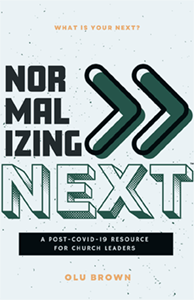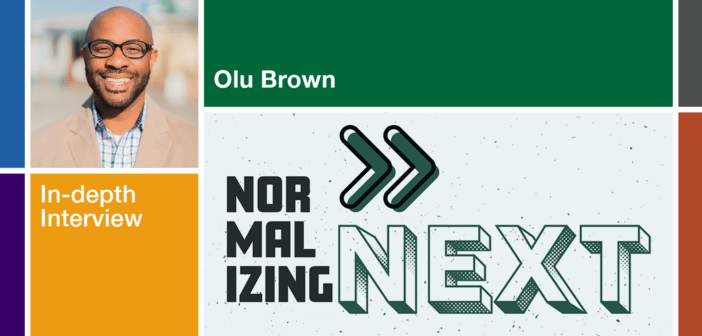How can church leaders embrace rather than fear the future? Lewis Center Director F. Douglas Powe interviews Olu Brown on how leaders can “normalize next” and begin living their future now by engaging innovative thinking, creative partnerships, and hybrid strategies to fulfill their mission.
Listen to this interview, watch the interview video on YouTube, or continue reading.
Douglas Powe: While most people have been focusing on the “new normal,” you’re suggesting that we look further ahead to the “next normal.” What do you mean?
Olu Brown: As leaders, we can’t only look at where we’ve been or where we are; we have to project ourselves into the future. I wrote Normalizing Next to encourage leaders to think about tomorrow, but also about tomorrow next year and a decade from now. “Normalizing next” means leaders and congregations determine that “next” is not to be feared but embraced. As they engage in creative and innovative thinking and partnerships, they will begin living their future now. The whole passion genesis for the book is to give some hope and inspiration to leaders in the church, both lay and clergy.
Douglas Powe: A part of that of course is a willingness to change. How can leaders help congregations see change as an ongoing work and not something we do just to get to a settled place?
Olu Brown: This is where we look not only to the future but also to the past. And looking to the past, we understand that organizations, particularly churches, that have become vital and sustain vitality have always changed and adapted to the change around them. The inspiration for helping leaders normalize change is that we’ve always done it. And when we do change consistently, we’re able to speak to the current culture, we’re able to reach and evangelize, and we’re also able to better resemble being the kingdom of God here on earth.
If you think about Jesus’s ministry, it evolved and it changed. He didn’t reach out to every disciple in the same way. He spoke to their culture. He spoke to where they were and then onboarded them and took them into the future. We all know that Matthew’s Gospel ends with the call to “go into all the world and make disciples of all nations ….” That’s Change 101. If you’re going to be serious about fulfilling the Great Commission, you also have to be serious about making adjustments and changes along the way.
Douglas Powe: The challenge of “going” is where a lot of congregations really do fall short. Do you think the problem may be that some congregations are not serious enough about the Great Commission?
Olu Brown: What I’ve found from coaching churches and leaders across the country is that they are serious but don’t have the strategy. It doesn’t matter how serious you are, if you don’t have a strategy, you won’t see the fulfillment of the Great Commission. I believe we are living in the greatest evangelistic season of our lifetime. But it’s one thing to believe it; it’s another thing to position yourself to achieve it. That’s why I wrote the book and why I talk about generosity, structuring your church for growth, leadership, and vision casting. A lot of churches need the basics to evangelizing in this post-COVID world, to show how serious they are about the Great Commission, and then partner that seriousness with the strategy needed to fulfill it.
Douglas Powe: Let’s talk a bit about vision. There are congregations now who are saying “We sort of liked it over there in Egypt. Let’s go back to the pre-pandemic time. Let’s go back to Egypt.” How do we elevate the imagination of a congregation that wants to return to their prior way?
Olu Brown: First, we have to do everything we can to inspire and give them the right information to continue moving forward. The inspiration comes from the Scriptures. We think about the prophet Joel, or we think about Habakkuk writing a vision. We are living in a season where we are casting vision about the future. And the future vision may be about a program for the church, or a new ministry for the church, or reaching the community in a different way, or going back to the drawing board and revisiting and rethinking everything. During the pandemic, a lot of pastors and leaders realized that church services didn’t have to last two-and-a-half hours. We really can revision our order of worship. And, oh, by the way, we had great worship in one hour, and it was very effective. We need to resource and give churches and church leaders that type of information.
Secondly, I’ve been telling those who want to go back to Egypt, “These past two years have been traumatic. It has been difficult. Everyone who is still alive has lost someone or something over the last two years. Why go through so much just to go back to the way things were? What does it say about all the trauma we’ve experienced if we just return to the way things used to be? My hope is that you will take the hardships and the lessons learned over the past two years and transform them into a new energy and a new resolve to ask what is God asking us to do right now? And as God answers that question, charge forward with all the energy, the anointing, the passion, and the resources you have.” That would be my response to those who want to go back to the way things used to be.
Douglas Powe: What about the church that responds to that question by saying, “God wants us back in our building and doing in-person worship again.”
Olu Brown: One thing we realized over the past two years is the building is not the church. It holds. It resources. It allows ministry to be facilitated. But the building is brick and mortar. And I hope those congregations have learned that lesson. The building is not your church. Regarding holding in-person worship again, some of our congregants say, “it doesn’t feel the same watching online” or “now that we’re back, this feels like church again.” But you really have to question that theology. If you look at Jesus’s ministry, it was predominantly outdoors. It was in community. It was on water. Calvary’s cross was on a hill. So, 99 percent of Jesus’s ministry was on the outside. What does that say about us when 99 percent of our ministry is on the inside?
Many have asked me, “How long should we do online or virtual worship?” My answer is, “Until Jesus comes back.” I would even take it up a notch or two. I would start having all our programs on two platforms, in-person and virtual. Vacation Bible School, in-person and virtual. Sunday school, in-person and virtual. Wednesday night Bible study, in-person and virtual. Not only Sunday morning, but every major program we offer — how can we build it on a hybrid platform so the whole world can see it?
Douglas Powe: What do you say to small congregations that don’t have the technology and resources to do everything in-person and virtually?
Olu Brown: Here’s my response. Focus on two different types of technology — low-tech and high-tech — and find your fit. For instance, I was talking to a pastor who is worshiping with his congregation via a conference call line. They can’t see each other, but they can hear each other. Now, that’s low-tech. But it’s still impactful and effective, and it works for them where they are. So, use what you have.
We’ve discovered that even our older adults will buy into technology if we introduce it in a way that helps them understand how they can use it and how they can benefit from it. It’s not just about having a smart phone or a laptop or a computer. It’s about helping an individual connect to their family, connect to the church, and be a part of God’s global community. Instead of focusing on nuts and bolts and bandwidth and technical phrases, you ask, “Would you like to participate in your grandchild’s baptism?” If their answer is “Yes”, and it will be “Yes”, then you simply show them how. And guess what? You’ve got a committed online viewer for the rest of their lifetime.
Douglas Powe: Any advice for how we can create a really good hybrid worship experience? How do you create an experience that integrates online worshipers into the work we’re doing? Where they are not just onlookers?
Olu Brown. First, we have to build a culture of acceptance around allowing people to worship in the way that’s best for them. We need to dismiss and dismantle the false narratives that demonize virtual worship. Second, we have to get the resources and learn the best practices. There are folks who teach and train on it. Third, we have to start at our own level. We would love to have a fully engaged online campus. But that may not be the reality for most churches in the United States of America or around the world. So, where do you start? For some people, it may be preaching and teaching and singing in their living room with their smartphone on a stand. But it continues to evolve. How does it evolve? By investing in a software platform that allows you to interact with the individuals who are watching. In our church we have an online host team in the same way you have ushers or hosts in your sanctuary. What this says to an online worshiper is, “You’ve thought enough about me as a member of this congregation, or as a guest, to engage me. You’re not just treating me as somebody who’s watching you have a wonderful worship experience but then forgetting about me after I log off.”
When we think about hospitality, we often think about it in person, but you also have to think about online hospitality and what it means to help your viewers feel welcome and accepted. And guess what? You practiced. You planned. And you prepared for them. You just didn’t wake up and say “Oh, by the way, we’re going to post this online.” No. “We thought about you the same way as we thought about individuals coming in person.”
Douglas Powe: How do you preach contextually in a hybrid format when at Impact Church you have people in person in Atlanta who know what’s going on in the city, but now you have people all around the world who may not care what’s going on in Atlanta?
Olu Brown: First, practice what you preach. Every Thursday, whoever is preaching practices their sermon. And on Sunday morning, we all arrive early, and we practice — not only the preacher but the liturgist and whoever else is talking from the stage. One of the reasons we practice before we preach is to go over the words and the different phrases and the different examples and to receive feedback.
Second, if you’re preaching in a particular city but broadcasting around the world, you need to avoid examples specific to your geographic area. For instance, if you use a story about going to a grocery store and mention the name of a popular grocery chain in your community, someone watching in Milwaukee or Asia will have no idea. But they know what a grocery store is. They know what a food service store is. By using that type of general language, you can connect with a larger share of your audience.
Doug Powe: You say it’s important to make it easy for people to get on the same page and move together toward a vision. Can you explain the philosophy of “three simple steps?”
Olu Brown: The most valuable commodity anyone has is their time. Think of all the things each of us manages in a single day. Someone might be passionate about the church and want to volunteer, but if they’re already managing 50 or 60 things, they don’t have the time or patience to go through 20 different steps with three or four different people. So, I tell those who are building volunteer systems, “Make it three steps or less.” Now, that doesn’t mean we don’t do background checks in areas where they are necessary or practice safe sanctuary. But in general, it should be three steps or less. For some it might be four or five. But they’re very simple. They’re very visible. And everyone responsible for those three steps is held accountable for following through with those who express interest. Because as I said, the most valuable commodity we have is our time. And we never want to waste anyone’s time — in particular in the life of the Church of Jesus Christ.
Douglas Powe: In the next three to five years, what do you see as critical for congregations to thrive?
Olu Brown: First, I think thriving churches in the future will be boutique-style churches with very focused, streamlined ministries. They will have a very clear focus on missions and outreach in their particular context. And they won’t try to be all things to all people. They’re okay referring people out to other churches that do certain things better. Second, they will have a very clear vision and mission, and they overemphasize it. They market it all the time, internally and externally. It’s in the lifeblood of every leader. It’s in every sermon, every song, every volunteer opportunity. The vision, the mission, is a part of the core DNA. Third is leadership development. They’re searching, even outside their church, for the best leaders to help move their ministry forward. So, if you happen to be in that grocery store and the salesperson is singing a song, you invite that salesperson to be a part of your church choir.
It’s the leadership development, internally and externally. It’s the clarity of vision. And it’s being very focused as a boutique style and size church. And then finally it’s taking some crazy risks through the power of the Holy Spirit and asking ourselves, “What is God up to right now that we want to be a part of?” And it’s not being afraid of the future or hostage to the past but truly believing the scripture, God will do exceedingly abundantly above all we can think or act or imagine, according to the power — and the translation is dynamite — that is at work within us (Ephesians 3:20). So, my encouragement is, God is with you. You can’t fail. Take a risk and trust that as you “normalize next” the best is yet to come.
 Related Resources
Related Resources
- Normalizing Next: A Post COVID-10 Resource for Church Leaders (Culverhouse LLC, 2022) by Olu Brown, available at Amazon.
- Moving Forward With Hybrid Worship by Olu Brown
- “Dream Big to Reach New People,” a Leading Ideas Talks podcast episode featuring Olu Brown
- 5 Keys to Great Online Worship Hospitality by Olu Brown
- “Imagining a Hybrid Future,” a Leading Ideas Talks podcast episode featuring Rosario Picardo
- Discovering God’s Future for Your Church Video Tool Kit






